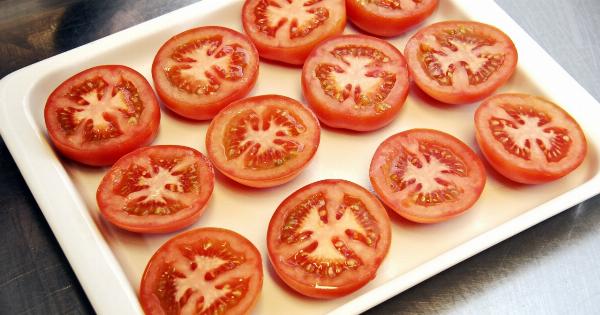When it comes to maintaining good health, a balanced diet plays a crucial role. Including a variety of vegetables in your meals can provide numerous health benefits.
Vegetables are not only low in calories and high in nutrients, but they also contain antioxidants that are essential for combating anemia, supporting vision, and improving memory. In this article, we will explore the top vegetables that are rich in antioxidants and can help enhance these specific aspects of your health.
1. Spinach
Spinach is a leafy green vegetable that is packed with antioxidants, including vitamins A, C, and E. These antioxidants help combat anemia by promoting the production of red blood cells.
Spinach is also rich in folate and iron, which are essential for maintaining healthy blood levels and preventing anemia. Additionally, the high vitamin A content in spinach supports vision health and protects against age-related macular degeneration. Furthermore, the antioxidants in spinach have been found to improve memory and cognitive function.
2. Kale
Kale is another leafy green vegetable that is loaded with antioxidants, such as vitamins A, C, and K. These antioxidants play a significant role in combating anemia as they support the absorption of iron from plant-based sources.
The high vitamin C content in kale also enhances iron absorption. Moreover, the abundance of vitamin A in kale promotes good vision and reduces the risk of eye diseases. The antioxidants found in kale can also help improve memory and cognitive function by protecting the brain from oxidative stress.
3. Broccoli
Broccoli is a cruciferous vegetable that is rich in antioxidants, including vitamins A, C, and E, as well as various phytochemicals. These compounds help combat anemia by aiding in the absorption of iron and supporting red blood cell production.
The high vitamin C content in broccoli enhances iron absorption even further. Additionally, the antioxidants in broccoli contribute to vision health and protect the eyes from damage caused by free radicals. Furthermore, studies have shown that the antioxidants in broccoli can enhance memory and overall brain function.
4. Brussels Sprouts
Brussels sprouts are cruciferous vegetables that are packed with antioxidants, such as vitamins A, C, and K. These antioxidants are instrumental in combating anemia by promoting the absorption of iron and helping in the production of red blood cells.
The vitamin C content in Brussels sprouts also aids in iron absorption. Furthermore, the antioxidants in Brussels sprouts support vision health and protect against age-related eye conditions. Additionally, studies have shown that the antioxidants in Brussels sprouts can improve memory and cognitive function.
5. Bell Peppers
Bell peppers, especially the brightly colored ones, are excellent sources of antioxidants, including vitamins A, C, and E.
These antioxidants are vital for combating anemia by aiding in the absorption of iron and supporting the production of red blood cells. The high vitamin C content in bell peppers enhances iron absorption. Moreover, the antioxidants found in bell peppers promote vision health and reduce the risk of eye diseases.
They also contribute to improved memory and cognitive function by protecting the brain against oxidative stress.
6. Sweet Potatoes
Sweet potatoes are root vegetables that are rich in antioxidants, such as vitamins A, C, and E. These antioxidants play a significant role in combating anemia by promoting the production of red blood cells and assisting in the absorption of iron.
The high vitamin A content in sweet potatoes supports vision health and protects against night blindness and other eye conditions. Furthermore, the antioxidants in sweet potatoes have been found to improve memory and cognitive function.
7. Carrots
Carrots are root vegetables that are packed with antioxidants, including beta-carotene, vitamin A, and vitamin C. These antioxidants are crucial for combating anemia as they promote the production of red blood cells and aid in iron absorption.
The vitamin A in carrots supports vision health and protects against night blindness and macular degeneration. Additionally, the antioxidants in carrots contribute to improved memory and overall brain function.
8. Beets
Beets are root vegetables that are rich in antioxidants, such as betalains and vitamin C. These antioxidants play a significant role in combating anemia by promoting the production of red blood cells and aiding in iron absorption.
The high vitamin C content in beets further enhances iron absorption. Moreover, the antioxidants in beets support vision health and protect against age-related eye conditions. Studies have also shown that the antioxidants in beets can improve memory and cognitive function.
9. Tomatoes
Tomatoes are vibrant fruits that are packed with antioxidants, including vitamins A, C, and E, as well as lycopene. These antioxidants are instrumental in combating anemia as they support the production of red blood cells and aid in iron absorption.
The lycopene in tomatoes contributes to vision health and reduces the risk of eye diseases. Additionally, studies have shown that the antioxidants in tomatoes can improve memory and overall brain function.
10. Red Cabbage
Red cabbage is a cruciferous vegetable that is rich in antioxidants, such as vitamins A, C, and K, as well as anthocyanins. These antioxidants help combat anemia by supporting iron absorption and red blood cell production.
The vitamin C content in red cabbage enhances iron absorption even further. Furthermore, the antioxidants in red cabbage contribute to vision health and protect against age-related eye conditions. Additionally, studies have shown that the antioxidants in red cabbage can improve memory and cognitive function.
Conclusion
Incorporating a variety of vegetables into your diet is essential for promoting good health.
The top vegetables mentioned in this article, including spinach, kale, broccoli, Brussels sprouts, bell peppers, sweet potatoes, carrots, beets, tomatoes, and red cabbage, are rich in antioxidants that can combat anemia, support vision health, and improve memory and cognitive function. By including these vegetables in your meals regularly, you can maximize the health benefits they provide.






























